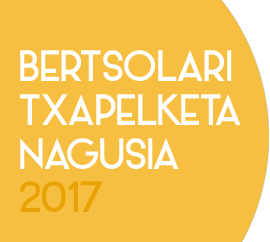The Bertsolari Championship final
On Sunday 17 December I witnessed one of the most amazing events in my life. The final of the bertsolari championship was taking place. Already at 9.00am, two hours before the competition was due to start, thousands of people were streaming into the Bilbao Exhibition Centre, hoping to secure good seats in the vast auditorium. By 11am the place was packed: not a seat was left. Throughout the day, the audience listened to the eight finalists' performances with rapt attention, laughing at humorous and witty exchanges, and visibly moved to the point of tears when the verses plunged into emotional depths.
I have long been interested in bertsolaritza. I knew that this was a very popular folk tradition of improvised verse. But until this day, I had not realised how extraordinary the bertsolaris' skills are, or with what incredible rapidity they can create a verse that conforms to stringent requirements of metre, rhyme, verse-form, and topic. The national championship is designed to test these skills to the limit. In some exercises, two bertsolari had to respond to each other, developing an argument or sharing views on a prescribed topic – in one thrilling exercise, they had to alternate on every line, sparking off hilarious quick-fire exchanges. In others, each bertsolari performed solo, rising to the challenge of creating several complex and coherent stanzas on a prescribed theme. These performances involved not only verbal creativity of an exceptional order, but also the ability to imagine oneself in different situations, for many of the exercises involved playing a prescribed role (as a parent and child competing for control of the games console; as a shy couple on their first date who find the restaurant they have chosen is full of their family and friends…) or inventing a scenario and role to fit a prescribed key phrase ("When I entered the room, everyone fell silent"; "I realise a car has been following me for the last half hour").
The eight competing bertsolari had been through a long and intense journey to reach that stage, through months of local and regional competitions. This was the culmination, and their nerves must have been stretched to breaking point: yet what was most impressive, to me, was that they showed nothing but good will to each other. In the exercises involving pairs, cooperation was more evident than competition, as each bertsolari gave the other clues, and their mutual attunement and responsiveness was what made the whole performance work.
How did they do it? Bertsolari today are often highly educated and articulate about their art, and can explain in detail their method of training, their preparation, their technique and their thought processes during performance. Nonetheless, what they do seems almost miraculous. It is as if all the artificial tests, challenges, and requirements of the competition, instead of constraining the performance, actually inspire it. Instead of impeding creativity, they seem rather to stimulate it all the more strongly. For what the bertsolari were producing was beautiful, original, memorable, subtle and evocative poetry. All the eight competitors were brilliant; each had his or her own style. The eventual winner, Maialen Lujanbio, was remarkable for the depth and dramatic power of the scenarios she evoked: a drug addict who returns to the family home after years of absence, shame and sorrow, only to find she is not welcome; a prostitute who wonders whether the blame lies with the client or with herself, even though she knows that she will be the ultimate loser. It was extraordinary to think that Maialen took only half a minute to reflect on the prescribed topic before she devised an entire situation, a character, a narrative, and a philosophical reflection on the theme, and delivered it in faultlessly smooth and well-integrated verses.
Thanks to the superb simultaneous translation service, I could get an impression of this extraordinary artistry even without knowing Basque – and how much more powerful it would have been if I could have caught, like the thousands of Basque-speakers present, the metaphors, ambiguities, subtleties and word-play that I am told characterise Maialen's style in particular, and the bertsolari's art in general.
What became very clear during the long and intense day - seven or more hours of live improvisation – was that performers and audience alike love the Basque language. The art of the bertsolari arises from that love of the living language, and also reinforces it. The revitalisation of Basque verbal art - through school programmes, voluntary classes, scholarship and research, media coverage, and organised activities including the four-yearly championship – has been an unparalleled success. None of this could have succeeded without the Basque people's deep love of their language and culture.
I am deeply grateful to the Mintzola Oral Workshop for having invited me to this wonderful occasion.

